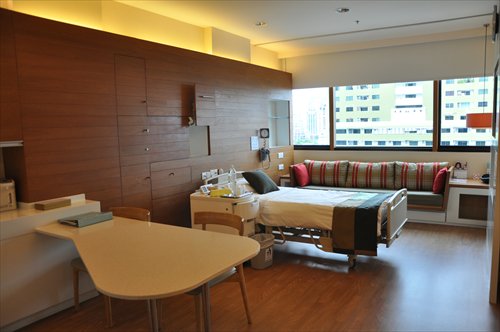HOME >> BUSINESS, METRO BEIJING
Thailand's boost in healthcare
By Yin Yeping Source:Global Times Published: 2014-9-15 19:53:01

The high standards of Thailand's private hospitals are attracting foreign patients. Photo: Yin Yeping/ GT
Thailand is best known for its white sandy beaches, bustling nightlife and tasty cuisine. Now, however, international visitors have more than tourism on their minds when visiting the country, with Thailand's healthcare system earning a reputation which rivals Western standards.In Thailand, over 1,000 public and 4,000 private hospitals operate in compliance with international standards, employing a high number of internationally trained physicians.
While public hospitals still maintain high standards of treatment, it is the private hospitals that have become the platform of changing in Thailand's medical system.
With its medical treatments attracting more patients from abroad, China is becoming a major focus of their market.
When Emily Soo, the head of the Chinese marketing department at Bangkok Nursing Home Hospital (BNH), started at the hospital in 2007, Chinese patients only counted for a small proportion of the hospital's overall intake.
"There was only me when I started to work in BNH," said Soo. "Now, we have six Chinese-speaking staff in total to deal with Chinese patients."
The increase of Chinese staff is intended to meet the rising number of Chinese patients attending BNH.
According to the Department of International Trade Promotion of the Ministry of Commerce of Thailand, the amount of Chinese patients that came to Thailand was 48,396 in 2012, and that number has continued to rise.
"In 2011, the average number of Chinese patients per month at BNH was around 120," said Soo. "Now, we have over 1,000 Chinese patients per month."
In addition to this, BNH opened a special Fertility Center in August 2013 which focuses specifically on treating Chinese patients. There are both Chinese and English signs in the center, with brochures and information sheets also in Chinese. All the medical staff can speak basic Chinese.
BNH is not the only hospital that has turned its focus towards the Chinese market.
Bumrungrad International Hospital, Asia's first hospital, was accredited by the US-based Joint Commission International in 2002. It has over 1,300 physicians and dentists working at the hospital, many of whom have international training certificates.
The hospital is equipped with Chinese clients' services, which include 24-hour hotline, embassy contacting service, pick-up service, reception service, and even visa application service.
Other hospitals such as the Bangkok Hospital launched a new hospital in Bangkok's Chinatown in 2014. It has been established to respond to the medical and healthcare needs of people in the Chinatown district as well as Chinese expatriates based in Bangkok.
Posted in: Press Release, Enterprise